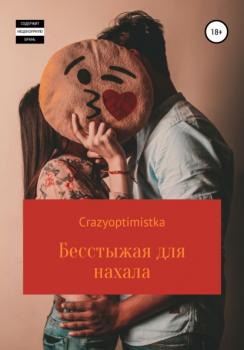Автор
Все книги издательства АвторДыра
Трагедия семейства Н., основанная на реальных событиях с элементами мистики. Переехав в дом своей мечты, семейство Н. стало его заложником, где все стали медленно сходить с ума. Отец семейства стал тираном и параноиком, мать религиозным фанатиком, дети совершили не поправимое. Как началось безумие, которое было неизбежным? Содержит нецензурную брань.
Огонёк
Выдающиеся люди – тоже обычные люди, а их яркие судьбы, если разобраться, складываются из незамысловатых историй взросления: в дружбе, в любви, в профессии. Рано осиротевшая ленинградка Фая Сапфирова в школьные годы уехала жить к бабушке и дедушке в Бурятию. Тогда, в непростые девяностые, девочке казалось несбыточным ее желание вернуться в большой город и стать журналистом. Случайные знакомства и задушевные разговоры со временем делают мечту реальной, однако работа в столице сводит Фаину не только с верными единомышленниками, но и с могущественными врагами. Продолжать честно служить своему делу на Родине становится намного труднее. Требуется принимать все более сложные и рискованные решения. Пожалеет ли она о них?
Бесстыжая для нахала
Свалился мне на голову негаданно-нежданно такой себе сюрприз. Под два метра ростом, весь в тату и с целым вагоном наглости. Добавив своим появлением щепотку остроты в мою и так сумасшедшую жизнь. А чтоб эта самая жизня малиной не казалась, приправьте все это слегка деспотичным новым шефом, мамой-хипстершей и бестолковым псом Баранкиным. Нравится? Тогда добро пожаловать в мою историю. Содержит нецензурную брань.
Скажи мне «нет»
– Никогда не смотри бешеной собаке в глаза, – учил меня отец. В глаза собакам я не смотрела. Вот только… однажды посмотрела в глаза волка, и с этого самого момента мой мир навсегда и бесповоротно изменился. Моя прежняя реальность рухнула куда-то в чёртову бездну, расплескавшись осколками. И теперь в моём новом мире всё иначе. Теперь в нём существует мужчина с глазами цвета спелых оливок, мужчина, чей взгляд может расплескиваться расплавленным янтарём, мужчина, который способен превращаться в огромного чёрного волка. Тот, от кого не уходят и не сбегают. Мужчина, которому ещё никто и никогда не смел отказывать, просто потому, что такому, как он, отказать невозможно. Такому, как он, никто и никогда не смел сказать «нет». Никто, кроме… меня.
Техники создания цифровой иллюстрации: карандаши, акварель, маркеры, коллаж, леттеринг и др.
Как рисовать на iPad цветными карандашами, акварелью, маркерами, пастелью, мелками, используя программу Procreate. В книге рассказывается какие кисти и текстуры можно использовать в программе Procreate, чтобы добиваться в иллюстрации имитации разных художественных материалов. Также даны примеры выполнения иллюстрации в разных техниках. В книге размещены ссылки для скачивания авторских кистей с разными художественными материалами и палитры для программы Procreate. Книга также дополнена раскрасками. Материалы основаны на личном авторском опыте, а также на анализе существующих на рынке кистей для рисования на iPad в программе Procreate. Книга будет полезна художникам и иллюстраторам всех возрастов и уровней и поможет разобраться в многообразии существующих материалов и техник в диджитал-иллюстрации. Если вы еще не знакомы с процессом рисования в Procreate, рекомендую изучить мою книгу «Мини-руководство по созданию цифровой иллюстрации»
Обед из трех блюд и любовь на десерт
Я только получила должность управляющей ресторана, как у нас появился новый шеф-повар! Мы ненавидим друг друга с первых минут, но вынуждены работать вместе. Он называет меня "диетическим йогуртом", я его – "перцем чили". Мы схожи лишь в одном: любви к десертам. Или… любви на десерт?
Профессионально беременна
Я Ева, 20 лет, красивая, умная, идеальная… охотница за деньгами. Он – Данила Беркутов, под 35, миллиардер и прожигатель жизни. И он – моя последняя жертва. Точнее, должен был ею стать. Но в какой-то момент всё пошло не так…
Птица высокого полета
Каждый человек надеется найти счастье, верит, что его подарит тот, на кого возлагает он свои надежды. Когда иллюзии рассеиваются, он остается среди руин картонного замка, убежденный, что жизнь жестока и несправедлива. Для героини книги Людмилы все потеряло смысл, когда ушел любимый муж. Хорошо, что сестра не позволяет потерять веру в светлое будущее и погрузиться в зеленую тоску. У нее сразу возникает множество идей. Одна из них – выдать Людмилу замуж. Как говорится, клин клином… Счастье приходит к тому, кто к нему готов. Для того, чтобы стать счастливым, вовсе не обязательно быть птицей высокого полета. Взявшись за руки, сестры смело входят в открытые судьбой двери. Веселья и приключений им хватит с лихвой…
Всё начинается со лжи
Курортный роман был прекрасен. Он врал, что свободен, я – что предохраняюсь. Мы расстались, чтобы никогда больше не встретиться. Я растила дочь, он мелькал на страницах новостей. Всё шло своим чередом, пока однажды он не появился в клинике, где я работаю, а его невеста не попросила о небольшой услуге.
Сама невинность
Кто она? Девушка в беде или бедовая девчонка, вечно попадающая в нелепые ситуации? Она ворвалась ураганом в мою размеренную жизнь, лишая сна и покоя. У нее длинные русые волосы, пухлые, влажные губы и большие синие глаза. Она пахнет мятой и соблазном, эта девочка стала моим пороком и грехом. Но она… САМА НЕВИННОСТЬ и мое искушение. Содержит нецензурную брань.









